By Amber Cortes
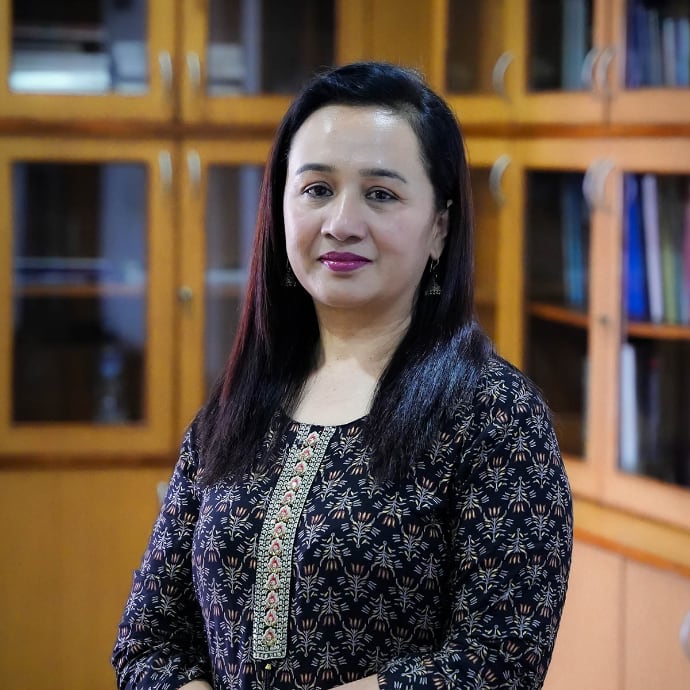
Neena Joshi, Senior Vice President of Asia Programs, Heifer International. Photo: Heifer
Heifer’s new Senior Vice President of Asia Programs, Neena Joshi, is used to being around strong women.
Born and raised in Kathmandu, Joshi says her childhood was vibrant and exciting.
“I was a typical city girl, that was my life,” Joshi says.
The house was alive with intellectual and political conversations, from guests of her father, a noted writer, poet, and activist.
“So we had variety of people in my home, and we as kids were allowed to be in those conversations,” Joshi says.
She also spent her childhood surrounded by strong women—her mother was a banker, at the time an unusually high position for a woman to hold, and her mother’s five sisters had all achieved career success in Kathmandu as well.
“So maybe that is how I got into what I do now, by trusting the power of women,” says Joshi.
Since then, Joshi has worked with thousands of women, empowering them to go outside their homes to become community leaders, successful businesspeople, and political powerhouses.
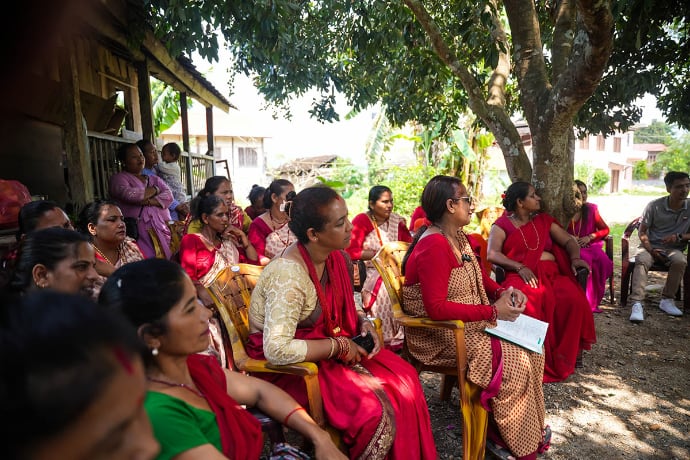
Kamalamai Social Entrepreneur Women Dairy Cooperative members. Photo: Heifer
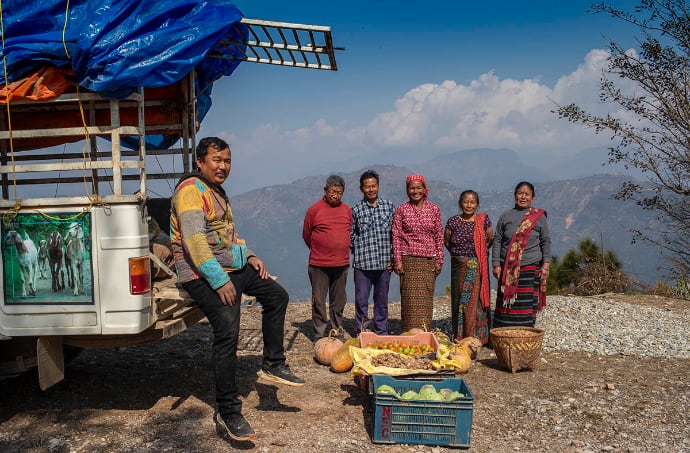
Photo: Heifer
She started at Heifer 24 years ago.
“I came to Heifer, I would say, accidentally,” explains Joshi. She was on a teaching path when she decided to interview with them.
Back then, Joshi says, the organization was small and Heifer’s office in Nepal had only ten employees. She loved being part of a dynamic team that could iterate and then come back to the drawing board.
“It was very fascinating for me, like a very raw person, who did not bring a lot of experience, but exploring, trying out things, succeeding, not succeeding, and again coming together,” Joshi says.
“So actually I’m very proud to say that I have been a part of the team who charted the growth for the Nepal program, which is one of the most successful and most impactful programs in Heifer,” Joshi says.
After serving in a variety of positions in the organization over the years, Joshi is now the Senior Vice President of Asia Programs, overseeing programs and offices across the region in India, Nepal, Bangladesh, Cambodia, and most recently, South Korea.
These include overseeing Heifer’s flagship project, Empowering Women Farmers in Nepal, which helps women form farmer cooperatives to improve financial management and find new distribution markets, and the Poultry Project of National Pride in Cambodia, which helps local farmers use new techniques to increase yields and income.
“When I look at the work that I do in these smaller pockets that we invest in, we see profound changes,” says Joshi. “But if you look at it from a systemic point of view and at a macroeconomic scale, then we still see that those problems are becoming bigger and bigger.”
Smallholder women farmers play a critical role in food production in Asia. Women make up about 43% of the agricultural labor force in the region, and this figure is even higher in some countries like Bangladesh and India.
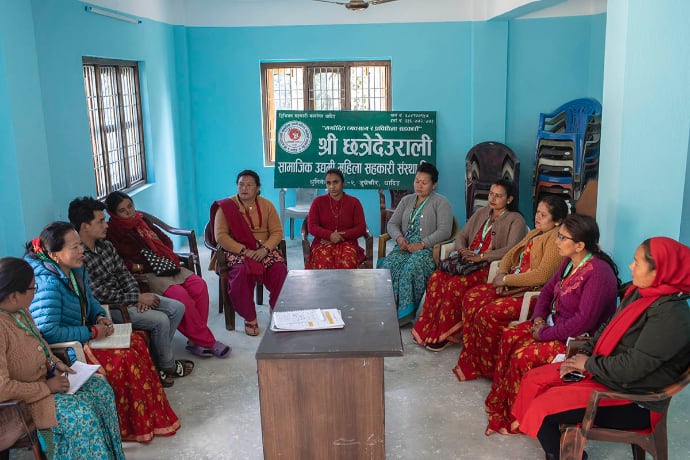
Photo: Heifer
Despite their large contributions many of these women often face significant barriers, including high poverty levels, food insecurity, and limited access to land, resources, and agricultural technologies.
Another example of a seemingly intractable problem comes in the form of cultural challenges.
“In Nepal, it’s a very patriarchal society,” Joshi explains. “And we primarily work with women. So these women are mostly expected to be inside the home and do the household chores and so bringing them out of that situation, in the groups, in the community, and [to] be with us and interact, is a challenge.”
But over time, Joshi sees the change, up close and personal. And it’s profound.
Joshi has known some of the women she’s worked with for the last 20 years and says she sees the transformation on both an individual and a community level.
“As you move on through the years, they become a completely different person,” Joshi says. “I’ve seen thousands of women emerge from being homemakers to community leaders to entrepreneurs to running for office, and even becoming members of Parliament.”
And nowhere is that change more obvious and impactful than within the past couple of years, when groups of smallholder farmer families form groups that become cooperatives. Heifer has helped all these cooperatives federate into an apex body of around 300 cooperatives and 400,000 households.
“So now I’m seeing how much power they hold,” says Joshi, who explained that just recently the president of the apex body met with the prime minister of Nepal.
“And the response and attention that they get when they say that I represent 400,000 households and primarily women, is very powerful,” Joshi says.
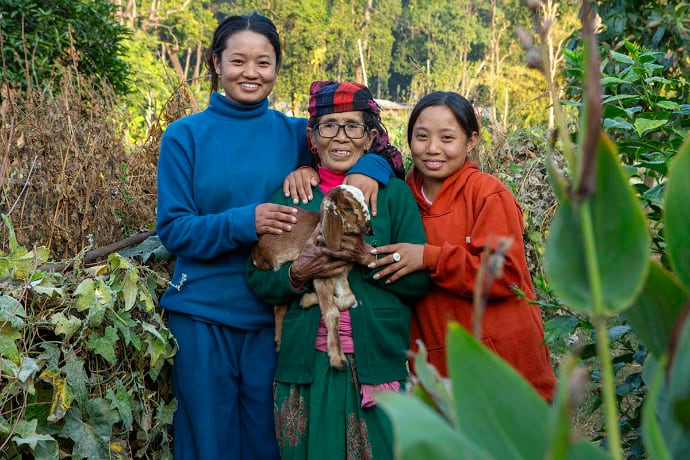
Photo: Heifer
Joshi says many of these women in the apex body were the ones she has known for years and brought out of the home to discover what they can accomplish, together.
“I cherish those moments when I sit with them and then have these conversations,” Joshi says.
In fact, pulling the camera up to reveal the big picture of collective power is what shapes the narrative for the work that she does at Heifer.
“I feel like there’s a switch that goes off when people realize what they can do as a collective,” Joshi says.
“These farmers are all smallholders. They do not have the resources to grow their one farm. But when you look at all the farmers together as a collective, then that is what gives you that economy of scale. That’s when they can have bargaining capacity in the market. That’s when they can talk with their government and demand services.”
In Joshi’s view, the true power of these collectives is how they have transformed these women’s individual challenges into a force for systemic change, and what they can do to impact their own futures.
But for right now, Joshi just feels grateful to have a front-row seat to see what changes the collective will make happen next.
“There are a host of things that they can do when they come together, collectively, the power of these 400,000 women together.”